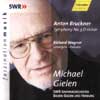Bruckner Symphony No 3; Wagner Lohengrin - Preludes to Acts I & III
Gielen’s occasionally tentative Mahler is overshadowed by a vivid Bruckner Third
View record and artist detailsRecord and Artist Details
Composer or Director: Anton Bruckner, Richard Wagner
Genre:
Orchestral
Label: Faszination Musik
Magazine Review Date: 9/2002
Media Format: CD or Download
Media Runtime: 67
Mastering:
DDD
Catalogue Number: 93 031

Tracks:
| Composition | Artist Credit |
|---|---|
| Symphony No. 3 |
Anton Bruckner, Composer
Anton Bruckner, Composer Michael Gielen, Conductor South West German Radio Symphony Orchestra |
| Lohengrin, Movement: Prelude |
Richard Wagner, Composer
Michael Gielen, Conductor Richard Wagner, Composer South West German Radio Symphony Orchestra |
Author:
The Bruckner is the thing here. For all Gielen’s operatic knowhow‚ there are finer recordings of the Lohengrin preludes (the fillups to the Bruckner) than these‚ just as there are quite a few better played and better conducted Mahler Sevenths than this 1993 BadenBaden version. ‘Nachtmusik II’ is beautifully judged but elsewhere Gielen’s is a somewhat halting and longdrawn account of the Mahler. The score itself could no doubt be cited as part of the case for the defence; it proposes forwardmoving tempos then endlessly arrests and modifies them. Yet all the work’s great interpreters balance the letter of Mahler’s instructions with the need to sustain pulse and purpose. Gielen is never as disjunct or slow as Klemperer in his notorious 1968 EMI recording but the reading often hangs fire. The playing is more than adequate but there isn’t that absolute certainty of utterance you need if‚ for example‚ the rumbustious finale is to emerge in all its splendour‚ pennants flying.
Pennants fly proudly in the much more recent Bruckner Third. This is a truly inspired performance‚ keenly argued‚ swift and cleanlimbed‚ yet one that is also sensitive to the characteristic Brucknerian musings in lyric subjects and at points of transitions. Gielen doesn’t give the strings and brass sufficient room for manoeuvre in the finale’s polkacumchorale (the first violins are cramped as to rhythm and tone) but with the performance sweeping all before it‚ this turns out to be less of a problem than one might imagine. Haitink creates more space at this point in his 1988 Vienna recording but his account of the finale runs into gearing problems of its own later on.
The Gielen was made over three days in May 1999 in the Festspielhaus in BadenBaden. It was evidently made with care; yet it sounds live. It even ‘settles’ as a real performance might‚ the orchestra shifting focus a few minutes into the first movement as the players begin to illuminate the drama from within rather than merely sounding it from without. Like Haitink‚ but unlike Barenboim in his rather more grandiose live 1995 Berlin Philharmonic recording‚ Gielen includes the scampering coda to the third movement which Bruckner added to this 1877 revision in January 1878. It is a curious afterthought which can sound trite. Not so here. Gielen’s performance of the Scherzo and Trio is so lithe and fiery you half expect the music to race on beyond its accredited end.
Brucknerians who lust after the weight and unfailing security of the Berlin or Vienna string ensembles may have more reservations about this Gielen version than I do. For me‚ the Gielen is hors concours principally because of the intuitive brilliance of a reading which profiles so vividly the ardent‚ aspiring mood of a provincial musician‚ intoxicated by his craft‚ giving his all in the service of the god Wagner to whom the work was dedicated. The recording by SouthWest German Radio’s Ute Hesse is everything it should be: bold‚ open and brighttoned‚ a knight in shining armour bearing gifts.
Discover the world's largest classical music catalogue with Presto Music.

Gramophone Digital Club
- Digital Edition
- Digital Archive
- Reviews Database
- Full website access
From £8.75 / month
Subscribe
Gramophone Full Club
- Print Edition
- Digital Edition
- Digital Archive
- Reviews Database
- Full website access
From £11.00 / month
Subscribe
If you are a library, university or other organisation that would be interested in an institutional subscription to Gramophone please click here for further information.




